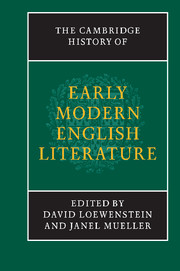Book contents
- Frontmatter
- Introduction
- 1 Modes and means of literary production, circulation and reception
- 2 The Tudor era from the Reformation to Elizabeth I
- 3 The era of Elizabeth and James VI
- 10 Literature and national identity
- 11 Literature and the court
- 12 Literature and the church
- 13 Literature and London
- 14 Literature and the theatre
- 4 The earlier Stuart era
- 5 The Civil War and Commonwealth era
- Chronological outline of historical events and texts in Britain, 1528–1674, with list of selected manuscripts
- Select bibliography (primary and secondary sources)
- Index
- References
13 - Literature and London
from 3 - The era of Elizabeth and James VI
Published online by Cambridge University Press: 28 March 2008
- Frontmatter
- Introduction
- 1 Modes and means of literary production, circulation and reception
- 2 The Tudor era from the Reformation to Elizabeth I
- 3 The era of Elizabeth and James VI
- 10 Literature and national identity
- 11 Literature and the court
- 12 Literature and the church
- 13 Literature and London
- 14 Literature and the theatre
- 4 The earlier Stuart era
- 5 The Civil War and Commonwealth era
- Chronological outline of historical events and texts in Britain, 1528–1674, with list of selected manuscripts
- Select bibliography (primary and secondary sources)
- Index
- References
Summary
The literature of early modern England was shaped by the manifold developments that made London, with a population of perhaps 50,000 in 1500 and 250,000 in 1600, the second largest metropolis in Europe by the later seventeenth century. With this growth came an increasing variety of communities and cultures. A well-established citizenry of craftsmen, retailers and wholesale traders enjoyed the traditional freedoms of London by virtue of membership in the guilds or ‘livery’ companies that organised the City’s trades. The expansion of international markets and the establishment of trading outposts around the globe transformed large portions of this citizenry into a wealthy, mobile and literate merchant class. At the same time, the permanent residence of the royal court in Westminster brought increasingly large numbers of the nobility to London, while the legal proceedings of Parliament, the chief courts of the realm and the Inns of Court drew officials, petitioners and litigants from throughout the counties. As the main conduit for the exchange of landed wealth, London became home to the aristocratic marriage market; its social season and developing luxury and leisure industries were attractive to urbanising gentry disposed to conspicuous consumption. The City harboured a large ‘youth culture’ of apprentices and domestic servants, male and female, recruited from the often distant countryside. Substantial portions of the greater London population were ‘strangers’ – continental traders, immigrants and communities of Flemish and French religious refugees – and ‘foreigners’ or non-free English migrants: the artisans, casual labourers, criminals, homeless and unemployed who frequented the rapidly growing suburbs outside the City walls.
- Type
- Chapter
- Information
- The Cambridge History of Early Modern English Literature , pp. 399 - 427Publisher: Cambridge University PressPrint publication year: 2003
References
- 42
- Cited by



